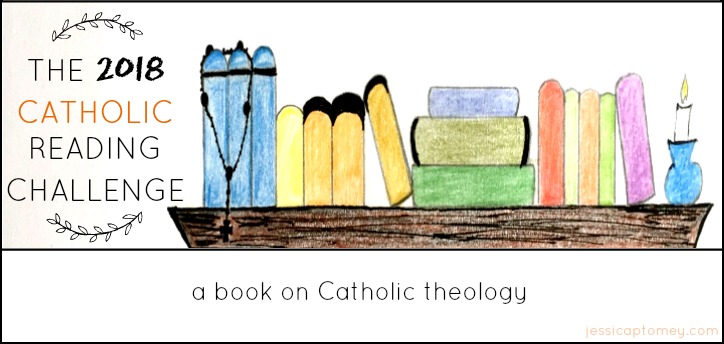We are down to the last three categories for the 2018 Catholic Reading Challenge. I wanted to get this next category pick posted in November, but oh well. Here we go…

Category: “a book on Catholic theology”
My Pick: A First Glance at St. Thomas Aquinas by Ralph McInerny
I picked this book for two reasons: (1) I needed to beef up my knowledge of Aquinas, and this seemed to be a good overview and introduction to him; (2) it was on my husband’s shelf, and he recommended it — it was in my house and vetted!
This book cheats a little for this category of “theology,” because it is actually more about St. Thomas’ philosophy. However, that was a nice surprise, because I got to see how Thomas’ philosophy (anchored in Aristotle) supports his theology. In fact, it is a great book to read if you want to understand how a Catholic theology and philosophy work together to help us talk about God. Aquinas is the guy the Church goes to as the ultimate philosopher/theologian; and Aquinas goes to Aristotle.
This book helped me be able to better articulate how philosophical knowledge (arrived at through logic) will never contradict theological knowledge (arrived at through revelation). McInerny quotes Aquinas:
“The gifts of grace are added to nature in such a way that a they do not destroy but rather perfect nature. Thus the light of faith which is infused in us by grace does not destroy the natural light of reason divinely given us. And although the natural light of the human mind is insufficient to manifest what is manifested though faith, nonetheless it is impossible that what has been divinely given us by faith should be contrary to what is given us by nature.” (p. 18)
McInerny actually shows how our knowledge about the perceivable world brings us quite far all by itself…all the way to the point where we then need the revelation of the Incarnation to take us the rest of the way.
McInerny demonstrates Thomas’s three ways of knowing God…as best we can know him. Thomas says that we can understand God through the negative — that is, but knowing what he is not. We can also talk about him through analogy (what he is like). As to positive knowledge of God, we can describe true things about him, but never perfectly. Philosophy and theology help us to discuss God in these three ways, but we will never perfectly understand or know him in the positive — for if we did, he would not be God.
Lastly, I appreciated how McInerny gave three ways that we use philosophy in theology: (1) “to demonstrate the preambles of faith,” like the existence of God; (2) “to make known what is of faith by way of similitudes;” and (3) to respond to contradictions of the faith and show them to be untrue.
There’s a lot of good stuff in this short book. If you have wanted an introduction to Aquinas, then this would be a great start. And you will get the added bonus of understanding Aristotle a little bit better too.
What did you read for “a book on Catholic theology”?

Copyright 2018 Jessica Ptomey
